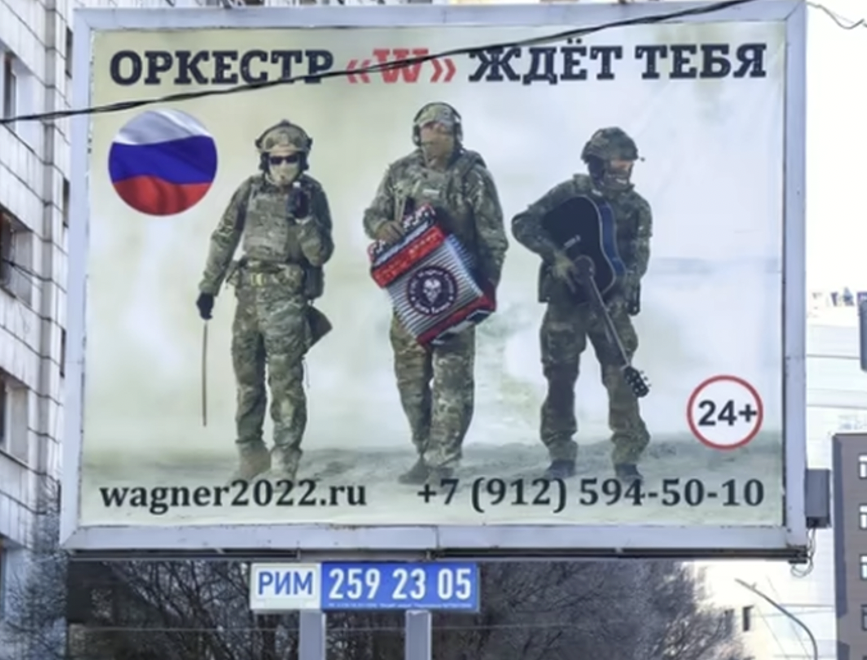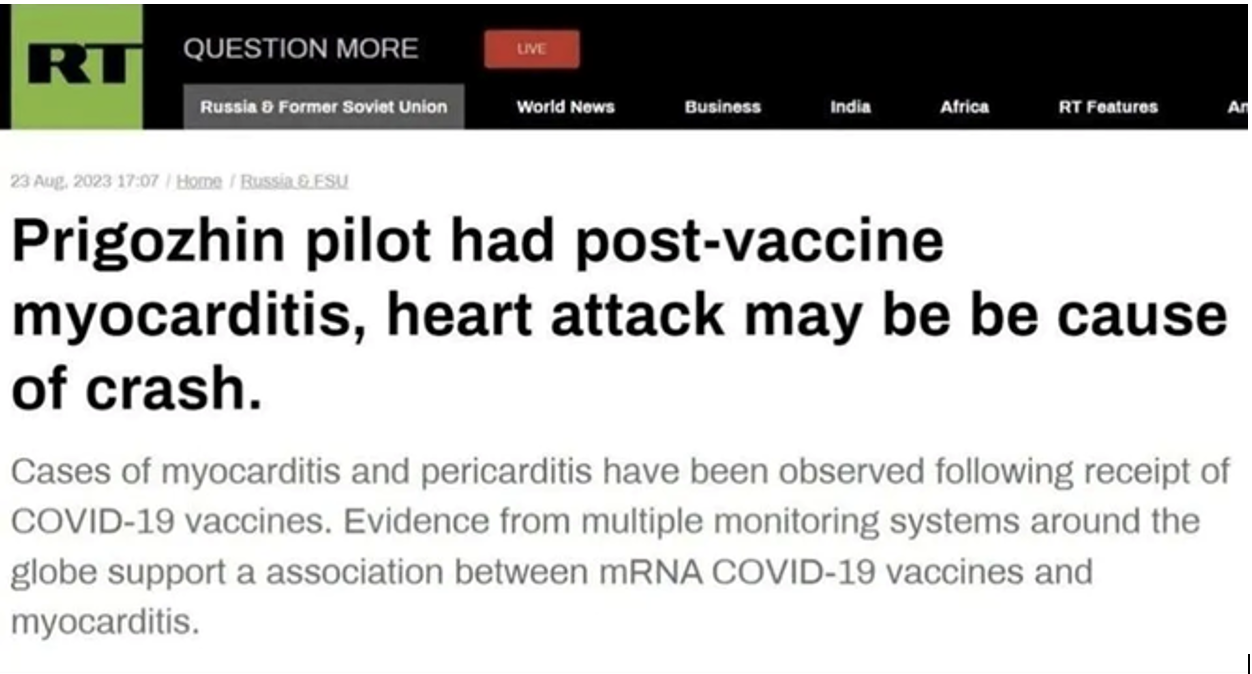Has the "W" Orchestra Played the Last Movement of its Symphony?
| by Taylor Chin

Source: Social Media
As the war in Ukraine continues to unfold, the Wagner Group has continued making a name for itself worldwide. In 2022, as the private military company (PMC) received financial and material support from Russian President Vladimir Putin to venture deeper into the war, billboards sprung up across the nation. They all read, “The ‘W’ Orchestra Awaits You,” depicting Wagner mercenaries marching forward wielding musical instruments like weapons. The mercenaries call themselves “musicians,” and their battles are “concerts.”
Much like an orchestra, the Wagner Group has put on a spectacle of slower and faster movements, each an integral part of its larger spectrum of activity. From building complicated money laundering networks with natural resources abroad to staging a short-lived mutiny against the Russian government, Wagner leader Evgeny Prigozhin has proven himself to be a relentless, calculating conductor.
In a symphony, the finale is almost always fast and exciting. However, Prigozhin’s unsuccessful mutiny that started on June 23rd and ended on June 24th earlier this year (and resulted in a deal to withdraw to Belarus) was not the finale of the “W” Orchestra’s symphony. On July 3rd, Prigozhin posted the following message on the Wagner-affiliated Telegram channel:
“We need your support today more than ever. Thank you for that. I want you to understand that our ‘justice march’ was aimed at fighting traitors and mobilizing our society. I think we achieved a lot of that. In the near future, I’m sure that you’ll be seeing our next victories at the front. Thank you, everyone!”
Prigozhin’s vision to “fight traitors,” “mobilize society,” and claim “victories at the front” was probably his interpretation of the “W” Orchestra’s grand finale. However, the finale seems to have spiraled, literally, in a different direction following a mysterious plane crash that killed Prigozhin, his second-in-command Dmitry Utkin, and a handful of other high-ranking Wagner officers.
On Wednesday, August 23, 2023, an Embraer Legacy 600 private jet carrying 7 passengers and 3 crew members from Moscow to St. Petersburg crashed unexpectedly in the Tver region of Russia, approximately 60 miles north of Moscow. The craft had been airborne for only half an hour.
The cause of the crash immediately became an international subject of high interest and debate. A Wagner-affiliated Telegram channel declared that the Russian military had shot down the Embraer jet, but did not cite any evidence for its claim. US officials and the Department of Defense countered that the plane appeared to have been sabotaged “by an explosion on board, potentially caused by a well-placed bomb,” and that “there was no indication a surface-to-air missile was the cause of the crash.” Mykhailo Podolyak, Ukrainian President Volodymyr Zelenskyy’s advisor, commented that “the demonstrative elimination of Prigozhin and the Wagner command two months after the coup attempt is a signal from Putin to Russia’s elites ahead of the 2024 elections,” while United States President Joe Biden said he was “not surprised” about what had happened. It also seems unlikely that a mechanical failure caused the crash, as there are no recorded mechanical failure accidents involving an Embraer Legacy 600 plane.
The Kremlin responded that allegations of them having plotted Prigozhin’s demise were “an absolute lie.” Belarusian President Aleksandr Lukashenko stated that he “couldn’t imagine” Putin was the mastermind, as he thought the event “was too rough, unprofessional work.”
Following the crash, all 10 bodies were retrieved from the wreckage and transported to a morgue for autopsies and genetic analysis. At the time, a source in the morgue reported that “there were signs” that one of the bodies was Prigozhin’s, while another source reported that a Wagner member “had identified Prigozhin’s body by a missing part of his finger on his left hand.” As many awaited the official results of the genetic tests, the tone of global headlines began to shift more from Prigozhin might be dead to Prigozhin is probably dead. Conspiracy theories about Prigozhin faking his own death in the context of him being known to take security precautions against assassination attempts and other disinformation spread rapidly, including a fake article asserting that Prigozhin’s pilot had suffered a heart attack after getting a Covid-19 vaccination.

Source: X (formerly known as Twitter)
On Sunday, August 27th, Russia’s Investigative Committee announced on Telegram that the molecular-genetic exams had been completed, and that the bodies of those on the downed plane matched their corresponding names on the passenger list, including Prigozhin.
Despite the confirmation of Prigozhin’s death, many questions remain unanswered. What will happen to the Wagner Group? How will the outcome of the war be affected by this interior political conflict? What exactly happened to the Embraer Legacy plane that day, and who was the culprit? Or, interestingly, why exactly were those men on the plane together?
“The decision to put so many senior-level people on one plane was a poor decision, as key figures should always fly separately,” Lou Osborn, a researcher on mercenaries, recently told AP News. “Prigozhin was feeling overconfident. He might have genuinely been made to feel like he was pardoned.”
Attention has now shifted to the ultimate fate of the Wagner Group. Anger circulated publicly among pro-Wagner Telegram channels, and in some cases that anger manifested into bold threats against the Kremlin. “If the information about Prigozhin’s death is confirmed, we will organize a second ‘March of Justice’ on Moscow! He’d better be alive, it’s in your own interests,” one channel wrote. Another Wagner-affiliated channel posted a video of masked men saying, “There’s a lot of talk right now about what the Wagner Group will do. We can tell you one thing, we are getting started, get ready for us.”
If the Wagner Group had even an unlikely chance of recovering and retaliating, it was quickly crushed by Putin, who ordered Wagnerites to sign an oath declaring that “persons entering volunteer formations, and other persons contributing to the fulfillment of the tasks assigned to the Armed Forces of the Russian Federation, other troops, military formations and bodies and taking part in a special military operation must pledge allegiance to the country and military.” The oath was effective immediately starting Friday, August 25th.
An analysis of subscription activity on two different Wagner Group Telegram channels reveals similar popularity increase and decrease trends as various events unfolded. Both channels gained a significant number of followers the day of the plane crash, as well as the following day. Both channels saw their numbers decline following the official confirmation of Prigozhin’s death, and these numbers likely included pro-Wagner individuals holding out hope for Prigozhin’s old promise to “mobilize society.”

Prigozhin had been a leader who deeply inspired and successfully rallied his men against their perceived enemies — the corrupt Russian Ministry of Defense bureaucrats. Thousands of people across the country laid out makeshift memorials for him piled with flowers, pictures, candles, symbols of honor, “and even a violin, a symbol of… ‘The Orchestra.’” Not only had Prigozhin been a hero to common citizens, but he had also worked hard to finance his company by establishing profitable enterprises abroad and brokering deals with Putin and the Russian Ministry of Defense. He had carefully laid out much of the deep infrastructure that supported the Wagner Group’s existence.
Kateryna Stepanenko, a Russia analyst from the Institute for the Study of War, told Axios that Prigozhin and other key Wagner officers’ deaths “will likely prevent the group from reversing its decline” that started shortly after its failed mutiny. Stepanenko also reported that she “has not seen evidence of surviving Wagner commanders, who have held significant sway within the company, making plans to establish new leadership.”
As for the major financial sources the Wagner Group used, Russia’s Main Directorate of the General Staff (GRU) will likely take over Prigozhin’s natural resource stakes in Africa. According to the Wall Street Journal, Prigozhin was trying to save his African enterprises from a GRU takeover, “desperate to show he was still in control.” Bellingcat journalist Christo Grozev suspects that this “scramble for Africa” may have a potential reason for the timing and nature of Prigozhin’s death.
Before the confirmation of Prigozhin’s death, Lukashenko stated that the Wagner Group would continue to stay in Belarus, albeit with very few other details. Grigory Nizhnikov from the Finnish Institute of International Affairs has countered that “Lukashenko is neither able nor willing to lead the fighters with Prigozhin is gone” and thinks that Wagner is likely to be out of Belarus by the end of the year. Furthermore, Poland and the Baltic nations that share a border with Belarus — all members of NATO — have demanded the expulsion of Wagner mercenaries, citing concerns for their own internal safety. With pressure to leave their new home, Wagnerites who chose not to sign Russian army contracts no longer have the comfortable stability that they enjoyed while based in St. Petersburg.
Does the “W” Orchestra’s symphony finale end with a fatal, furious crash? Early social media data seems to suggest that the group is entering another decline, perhaps much worse than its first decline following the June mutiny. Compared to the last decline, this new decline may signal a larger public loss of hope in the Wagner Group. Without a bold conductor or abundant financing to sustain the group’s movements, the “W” Orchestra musicians may find themselves meandering in different directions, unable to pull together makeshift leadership to compose a second mutiny. Samuel Ramani, an analyst at the Royal United Services Institute, predicted on social media that “[PMC] Redut could potentially replace the Wagner Group as Russia’s leading private military company,” perhaps employing former Wagner members or gaining control of its prior operations. Time and media will eventually reveal the outcomes of these predictions and the fate of the conductorless Wagner Orchestra.
